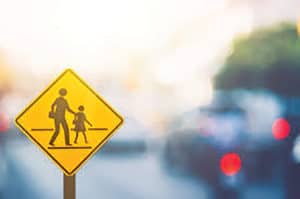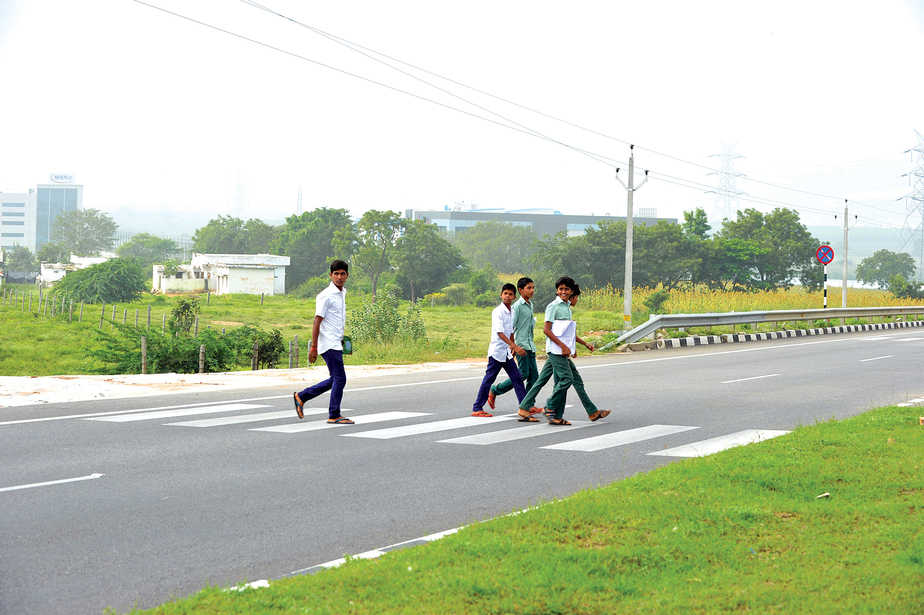Children continue to die in road accidents at an alarming rate while traffic rules are flouted and safety norms are ignored
On average, close to 43 children die every day in road accidents in India. And the rate of child casualties has remained unchanged for quite a while now. Studies have also shown that the numbers have shown no signs of decreasing. And the recklessness of drivers has become a significant danger for road safety.
The ones who are most at-risk when it comes to road accidents are street children — those living on the footpaths and selling their wares at traffic signals. Children as young as seven and eight years weave through the traffic, knocking on cab windows, trying to sell pens, flowers and the like.
Deepu, 10 years old, sells car accessories at the Mehrauli-Badarpur crossing. When asked about the danger of running around busy roads, he says that he is now used to it. He watched his father and older brother do it. He also confesses that he rather enjoys the activity, even though he knows that it is risky. “Mazaa aata hai,” (It is fun) he says, “gaadion ke saamne bhagna,” (running in front of cars). It’s like a game for him. He is still too young to understand the risk of potential accidents when he does such things.
According to a study done by Childline India, the most frequent victims of road accidents are children below the age of 14.
According to NCRB records, between 2005 and 2016, a total of 69,425 children aged 0-14 years old died in road accidents. Several precautionary measures have been identified to avoid such accidents and casualties on streets that are particularly heavily populated with children. Adopting ‘traffic calming’ methods, setting strict speed limits and parental or guardian accountability are all of utmost importance to curb these incidents.
Suravi Sinha Roy, 22 years old, was involved in a car accident on her way back from school. “It was partly my fault — but I also think that our driver should have been more careful with a child in the front seat.” Sinha availed of carpool service all her school life. “I used to be a very restless child, and the car we were riding back home in was an old Ambassador.” Three of her classmates were in the backseat.
“I was trying to turn on the radio, and was twisting the knobs on the dashboard. In the middle of a flyover, something happened — to this day I’m not clear about what exactly happened. But the car stopped in peak traffic, the steering wheel slid forward by a few inches, and another car hit us from the back.” She was so shocked that she started crying immediately as people came over to check on us. Thankfully, besides being jolted and one of them being slightly concussed, the car was the only thing that sustained any serious damage. “When I think about it now, I think how much more serious it could have been.”

As seen in Roy’s account, many school children have been involved in accidents due to the inattentiveness of bus drivers, overspeeding by truck drivers and dense fog. Indians have the poorest road sense in the world, which is exacerbated by inadequate enforcement of traffic rules.
All vehicles carrying school children are supposed to have a warning stating that there are children on board, vehicles are supposed to slow down on streets where there are school buildings, and the number of children is definitely not allowed to exceed the seating capacity. The last of these rules is the one that is most cavalierly broken on Delhi streets. Vans, cars, and buses are stuffed to bursting capacity — with children wreaking all kinds of havoc in the backseat.
As for passenger cars, despite the provision of seatbelts, children are regularly seen sitting on people’s laps. Car seats for infants have also proved to be a good precaution for child safety in vehicles, but are not mentioned in the Motor Vehicles Act.
India is yet to match up to global vehicular safety standards, and it is time children stop paying the price for it. Anyone driving a vehicle or even travelling in one is personally responsible for the collective safety of everyone in and around the vehicle. As Steve Wynn said, “If I can complain about traffic I have no one to name but myself.”





